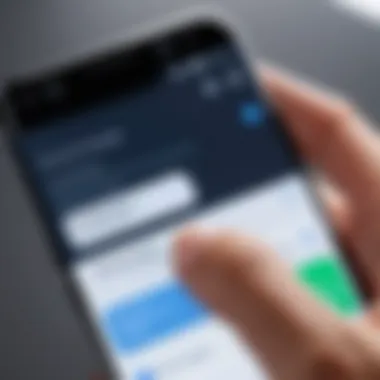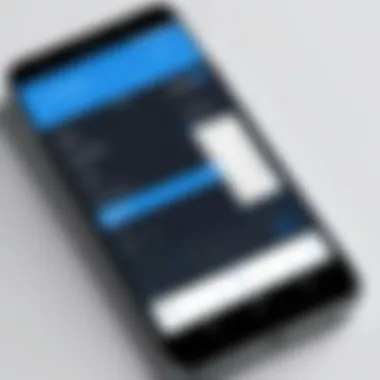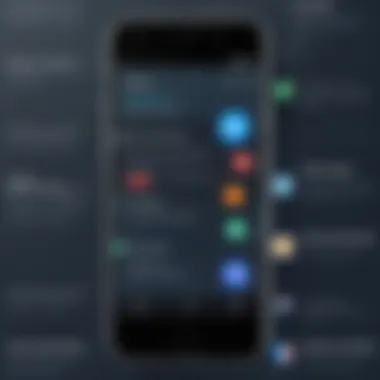Mastering Recurring Text Messages on Android Devices


Intro
In today's fast-paced world, effective communication is vital. One way to streamline your messaging strategy is by scheduling recurring text messages on your Android device. This functionality enhances organization and personal productivity, allowing users to communicate consistently without constant mindfulness.
People often overlook the ability to plan messages. However, it is a tool that can transform how you manage daily tasks, reminders, and essential notifications.
This guide will delve into the nuances of scheduling recurring messages, focusing on the available applications and features specific to Android. It will also assess workarounds that can optimize your messaging experience.
By mastering this skill, users can easily automate their communication for both personal and professional needs, ensuring nothing important slips through the cracks.
Understanding the Need for Scheduled Text Messages
In today's fast-paced world, effective communication is vital. Scheduled text messages provide a solution to ensure that important information is delivered at the right time. They cater to personal reminders, business notifications, or any communication that needs to occur without oversight. The ability to automate messages alleviates the pressure of remembering to send them, especially when life becomes busy. This section discusses why mastering this skill is essential in maximizing efficiency.
Importance of Timely Communication
Timely communication can be the foundation of successful interactions. For instance, in a professional setting, sending reminders about meetings or deadlines ensures that all team members are aligned and informed. Missing a message can lead to confusion or missed opportunities.
- Professional settings: A scheduled message can remind team members of upcoming meetings or allow for follow-ups on projects.
- Personal settings: Sending reminders to family members about appointments or events can foster better planning.
- Global reach: With contacts in different time zones, scheduling messages can optimize communication strategies.
By mastering scheduling techniques, users enhance their ability to communicate effectively, eliminating delays that could impact their responsibilities. The immediacy of text messaging, paired with automation, allows for a seamless flow of information that adapts to the user's lifestyle.
Benefits of Recurring Messages
Recurring messages are a powerful tool for structuring regular communication. Here are some benefits highlighted in this approach:
- Consistency: They provide steady reminders for tasks, helping establish a regular routine.
- Efficiency: Automated texts reduce the need for manual intervention, saving valuable time.
- Flexibility: Users can configure messages to send at various intervals, adjusting to personal or professional needs.
- Reduced cognitive load: With reminders set, individuals can focus on other pressing tasks without the constant worry of forgetting.
Recurring messages foster a reliable system of communication, ensuring that important notifications are not overlooked. By embracing this strategy, individuals enhance their productivity and organization.
"Employing scheduled and recurring messages empowers users to communicate effortlessly, facilitating both personal and professional interactions with finesse."
In summary, mastering the art of scheduling recurring text messages addresses the necessity for timely communication while offering various benefits that improve overall messaging efficiency.
Overview of Android Messaging Capabilities
Understanding the capabilities of Android messaging is crucial for anyone looking to master scheduling recurring text messages. The Android platform, a popular operating system for mobile devices, offers various built-in messaging features. However, users often find their needs extend beyond these standard options. This section will explore both standard features and the inherent limitations, providing insight into the messaging landscape.
Standard Messaging Features
Android devices come equipped with several standard messaging features built in. Users can easily send, receive, and organize messages through applications like Google Messages or Samsung Messages. Some key features include:
- Group Messaging: The ability to send messages to multiple recipients. This is vital for keeping connected with large groups like family or friends.
- Rich Media Support: Supports multimedia messaging, which allows users to share images, videos, and audio messages, enhancing communication.
- Message Search Function: Users can search through their message history, making it easy to locate important communications.
- Read Receipts: Some messaging apps provide indications when the recipient has read the message, fostering a better understanding of communication flow.
These features demonstrate the foundational capabilities of Android messaging. They serve basic communication needs effectively but often lack advanced scheduling functions.
Limitations of Default Applications
While standard messaging apps on Android provide essential functionalities, they come with notable limitations concerning scheduled messages. Users may encounter issues such as:
- Lack of Recurring Messaging: Default applications do not support the automated sending of recurring messages. Users cannot schedule messages to be sent at regular intervals, which is a significant drawback.
- Limited Customization: Users can find it hard to personalize their experience. Options for customizing scheduled messaging, such as selecting specific days or times for sending messages, are often missing.
- Inconsistent Updates: Not all Android devices receive timely updates, leading to inconsistencies in the features available to different users.
- No Integration with Other Applications: Default messaging apps typically operate in isolation, without options for integration with calendars or tasks, limiting overall functionality.


These limitations create a need for users to explore third-party applications for enhanced messaging capabilities.
Recognizing these shortcomings is the first step toward improving messaging practices. By understanding both the benefits and limitations of standard Android messaging capabilities, users can make informed choices about how to develop more efficient communication methods, particularly when seeking to schedule recurring text messages.
Exploring Third-Party Applications
In the realm of scheduling recurring text messages on Android, third-party applications play a crucial role. While the default messaging apps on Android devices may provide basic functionalities, they often lack the advanced features that many users need. Third-party applications typically offer enhanced features and greater flexibility, making them indispensable for individuals seeking to master text message automation.
These apps allow users to tailor their messaging experiences, integrate with other services, and streamline their communication. This section will delve into the criteria for selecting appropriate applications, explore some of the popular ones available, and provide a comparative analysis to assist readers in making informed choices.
Criteria for Choosing Applications
When evaluating third-party applications for scheduling text messages, several critical criteria should be considered:
- User Interface: A clean and intuitive interface enhances usability. Users should be able to navigate the app with ease.
- Feature Set: Look for features specifically for scheduling messages. Support for recurring messages, reminders, and other automation tools are valuable.
- Compatibility: Ensure the app is compatible with various Android versions and devices.
- Reviews and Ratings: Investigating user reviews can provide insight into an app’s effectiveness and reliability.
- Security Measures: Security is vital. Check what permissions the app requires and ensure it follows best practices for data protection.
Choosing the right application based on these criteria can significantly enhance the user experience when scheduling recurring messages.
Popular Apps for Scheduling Texts
Several third-party applications stand out in the market for scheduling recurring texts:
- Textra: Known for its customization options, Textra provides users the ability to schedule messages easily and features a sleek interface.
- AutoSMS: This app allows users to automate their text sending and schedule messages with specific time intervals.
- Pulse SMS: Pulse SMS not only offers scheduling capabilities but also features cross-device syncing, ensuring users can manage their messages from any platform.
- Google Messages: Although part of the default system, its newer versions include additional scheduling features that make it competitive with dedicated apps.
These applications cater to various needs, making them popular choices among Android users.
Comparative Analysis of Various Apps
To assist users in making informed decisions, a comparative analysis of popular third-party applications follows:
| App Name | User Interface | Feature Set | Compatibility | Security Level |
| Textra | Excellent | Rich | Android 5.0+ | Good |
| AutoSMS | Good | Basic | Android 4.4+ | Moderate |
| Pulse SMS | Very Good | Advanced | All Platforms | High |
| Google Messages| Good | Moderate | Android 5.0+ | High |
Each app has specific strengths and weaknesses. It is crucial for users to identify their requirements before making a choice.
By understanding the functionalities and limitations of each, users can select an appropriate application that aligns with their communication needs.
Step-by-Step Guide to Scheduling Messages
Understanding how to schedule messages on Android is quite important. This process can enhance communication efficiency significantly, especially for individuals with busy schedules. By taking advantage of scheduling features, you ensure that important messages reach their recipients at the right time, even when you are too occupied to send them manually. Additionally, this capability serves to remind you about key dates or tasks, thereby improving overall productivity.
Setting Up Your Device for Messaging
Proper configuration of your device is the first step towards effective scheduling of text messages. Initially, verify that your Android device has the latest operating system updates. Most manufacturers, such as Samsung and Google, frequently push updates that may enhance messaging functions. After confirming updates, make sure the default messaging app is correctly set up. For many users, Google Messages is a solid choice. Enabling necessary permissions for messaging is key here, ensuring the application can send messages on your behalf.
Configuring Scheduling Options
Once your device is set up, explore the scheduling options available. Check your chosen messaging app for options related to message scheduling. In Google Messages, for example, users can access scheduling features by simply long-pressing the send button. A pop-up for scheduling will usually appear. Selecting the date and time for the message to go out is straightforward. Keep an eye out for additional settings, such as recurrences, which might allow for repeating messages.
Creating a Recurring Text Message
To create a recurring text message, start by drafting your message in the app. After writing, look for the scheduling icon. When selecting this, input the specific recurrence pattern that fits your needs—daily, weekly, or monthly, for example. It is crucial to preview the message and the scheduling settings, as errors can lead to miscommunication. Always consider the recipient's time zone if they are located elsewhere, to avoid unwanted disturbances.
"Utilizing scheduled messages can streamline communication and save valuable time, allowing you to focus on more pressing tasks."


In reviewing these steps, it becomes evident that mastering scheduling on Android is not excessively complicated, yet it requires attention to detail and an understanding of your available tools.
Managing Scheduled Messages Effectively
Managing scheduled messages is a critical aspect of enhancing the user experience when it comes to text communication on Android devices. Scheduled messages offer a systematic way to ensure that important communications are delivered on time. However, simply scheduling a message is not enough; you must also have effective management strategies in place. This includes editing text messages as needed, deleting messages that are no longer relevant, and rescheduling those that require a change to the timing. Mastering these elements not only aids in improving personal productivity but also helps in maintaining clarity and relevance in your communications.
Editing Scheduled Texts
Editing a scheduled text message should be a seamless process. Often, situations may arise where the message content needs modification. For example, you might want to correct a typo or update information as plans change. In most Android applications, this can be achieved easily through the messaging interface. Navigating to the scheduled messages folder allows you to select the specific message and make requisite changes. This ability to edit ensures that your communication remains precise and relevant at all times.
Sometimes, a message may require more structural changes or even different recipients. In this case, you may have to create a new scheduled message entirely. Although this may seem cumbersome, it encourages a habit of ensuring only well-thought-out messages reach intended recipients. After all, a good message reflects your intent.
Deleting Scheduled Messages
Deleting scheduled messages is just as important as creating them. There may be times when plans change, and a message is no longer necessary. For instance, if an event is canceled, it is essential to remove any scheduled notifications to avoid confusion. Most messaging applications provide a straightforward mechanism for deleting messages. Selecting the message and choosing the delete option is typically enough. This action helps in maintaining order in your messaging schedule and preventing miscommunication.
Additionally, regularly reviewing your scheduled messages serves as a best practice. This review helps to find and delete outdated or irrelevant messages proactively. It is considered highly useful for those who schedule numerous recurring texts to ensure their communication remains fresh and relevant.
Rescheduling Previous Messages
Rescheduling messages can be essential to adapting to life’s unpredictability. You may discover that a planned message needs to be sent at a different time or even on a different day. Many Android messaging apps make this process intuitive. Usually, you can select the scheduled message and look for an option to change the time or date.
However, if the app does not allow for a direct reschedule, creating a new message and removing the original may be necessary. While this could be seen as an inconvenience, it sends out a clear signal that your communication reflects your current state. Adapting your scheduled messages efficiently showcases your proactive approach in managing your communications.
"Effective management of scheduled messages ensures your communication is both timely and relevant, adapting to the changing circumstances of your life."
Automating Text Messaging Processes
Automating text messaging processes can significantly enhance efficiency in communication management. For individuals and businesses alike, the ability to schedule and send messages automatically holds various advantages. This section addresses the necessity and benefits of automation in managing reciprocal communications. By exploring this concept, we can see how it streamlines interactions and saves time.
Using Automation Tools
Automation tools provide a streamlined way to manage texts. These are applications specifically designed to handle message scheduling and sending without manual input. Using these tools allows users to schedule messages on specific dates and times. Many of these applications come with additional features that can greatly aid in effective communication management.
Benefits of using automation tools include:
- Increased Productivity: Automating routine messages frees users to engage in other tasks. For example, businesses can set reminders to reach out to clients or customers without needing to remember to send each message manually.
- Consistency: Sending messages at regular intervals maintains an effective communication strategy. This is particularly useful for marketing campaigns or regular updates.
- Reminders: Automation tools often include reminder settings, helping users remember to send important texts. This reduces the risk of forgetting crucial communication deadlines.
When looking for an automation tool, consider user reviews, compatibility with Android OS, and specific features. Applications such as Textra, Pulse SMS, or Automate provide robust functionalities. Each has unique strengths that cater to different needs.
Integrating with Other Applications
Integration with other applications enhances the functionality of messaging automation tools. Synchronization allows for a more cohesive user experience and can lead to better productivity. Users can link their text messaging applications with calendars, task managers, and even customer relationship management (CRM) systems. This integration is critical for those relying on automated text messaging in professional contexts.
Key considerations for integration include:
- Seamless Workflow: Integrating platforms creates a smooth workflow. For example, linking a calendar app can allow users to automatically send reminders via text messages on specific days or after events occur.
- Data Access: Many apps offer the ability to pull or push data across platforms. This means scheduled texts can be informed by data from other apps, ensuring relevant and timely communication.
- Enhanced Functionality: Combining multiple apps results in an enriched user environment. For instance, connecting a messaging app with a social media platform allows users to receive alerts based on social media engagement—triggering timely responses.
Privacy and Security Considerations
In the realm of digital communication, privacy and security have become paramount concerns. When scheduling recurring text messages on Android, understanding how to protect personal information is crucial. These considerations not only safeguard users' data but also enhance overall trust in the applications utilized for messaging. Both the device and the software must be configured properly to prevent unauthorized access. Consequently, awareness of permissions and security features of apps is necessary for prudent usage.
Understanding Permissions and Privacy Settings


When you install an application for scheduling messages, it typically requests specific permissions. These can include access to your contacts, storage for saving messages, and the ability to send messages on your behalf. Understanding these permissions is essential. Not all applications handle user data the same way.
It is advisable to review each app’s permission requirements critically. For example, if a messaging app seeks access to your entire contact list without a valid purpose, it may raise red flags regarding its data handling practices. Users should always opt for applications that are transparent about their data usage. Adjusting privacy settings correctly can lead to enhanced control over who can access your information.
Tips for Managing Permissions:
- Regularly Review App Permissions: Periodically check which permissions your installed apps have. Revoke any that seem excessive or unnecessary.
- Use Built-in Privacy Features: Android often provides features to restrict app access to certain functionalities. Utilize them to limit data sharing as needed.
Choosing Secure Applications
Security is a critical factor when selecting an app for scheduling text messages. Not all applications provide the same level of protection for personal data. It is prudent to opt for applications that prioritize users' security. Look for applications that utilize end-to-end encryption for message transmission. This ensures that only the sender and recipient can read the sent messages.
In addition, consider the reputation of the application developers. Research user reviews and check for any reports of data breaches or poor security practices. Well-known applications such as Textra and Pulse SMS have built solid reputations with a focus on user privacy.
Factors to Evaluate Secure Apps:
- Encryption Standards: Check if the app offers strong encryption protocols.
- User Feedback: User experiences can indicate the reliability and security of an app.
- Regular Updates: Applications that frequently update often fix security vulnerabilities effectively.
"Remaining vigilant about the privacy settings and security features of messaging applications can significantly mitigate risks associated with data Insecurity."
Through cautious selection and understanding of messaging applications, users can really take control over their personal data. This is essential to maintaining effective and secure communication through scheduled text messages.
Future Trends in Messaging Technology
The landscape of messaging technology is in a state of constant evolution. As communication becomes ever more vital in our interconnected world, the enhancements in messaging applications are not only exciting but also necessary. Understanding the future trends in messaging technology helps users stay ahead of the curve, maximizing the benefits that new features offer. These trends promise to reshape how we engage with recurring text messages on Android, making it vital for tech-savvy individuals and early adopters to pay attention.
Emerging Features in Upcoming Updates
Messaging applications are expected to integrate a variety of groundbreaking features in forthcoming updates.
- Enhanced User Interface: Future designs will prioritize user experience, promoting intuitive interfaces that reduce clutter.
- Improved Scheduling Options: Advanced scheduling functionalities may allow users to create complex schedules with ease, like setting messages to repeat on specific days of the month.
- Rich Formatting Capabilities: Users might see improvements in how messages are formatted, supporting multimedia content, emojis, and advanced links.
- Cross-Platform Synchronization: It may become more common for messages scheduled on one device to sync across multiple platforms, ensuring seamless communication on all fronts.
These features will improve not only the efficiency of messaging but also enhance the overall engagement users have with their text communication.
Impact of AI and Automation
Artificial Intelligence is poised to be a game changer in the world of messaging. By incorporating AI technologies, applications can learn from user behaviors and preferences.
- Smart Suggestions: AI can offer intelligent recommendations for message content based on past communications, saving time for users.
- Automated Responses: Users might expect AI systems to generate context-aware replies, making conversations more fluid.
- Predictive Analytics: Algorithms can analyze patterns and suggest optimal times for sending messages, ensuring they reach recipients at the perfect moment.
- Personalized Messaging: AI can tailor messages to individual preferences. This includes acknowledging anniversaries or significant dates automatically, enhancing personal touch without effort from the user.
In summary, the integration of AI and automation can transform how users interact with messaging applications, turning scheduling of recurring text messages into a much more sophisticated and personalized experience. Overall, staying informed about these future trends will ensure users leverage the full potential of their Android messaging capabilities.
Finale and Best Practices
In the realm of digital communication, scheduling recurring text messages has emerged as an indispensable tool for enhancing efficiency and organization. This process provides users the ability to deliver timely reminders or maintain conversations without being physically present. The importance of mastering this skill lies not only in boosting personal productivity but also in ensuring that vital communications are not neglected. Understanding the tools and applications at one's disposal can streamline the act of messaging and reduce cognitive load.
Furthermore, adhering to best practices when managing scheduled messages can significantly improve your experience.
Summary of Key Takeaways
- Timeliness is Key: Scheduled text messages can improve communication effectiveness, ensuring messages reach their recipients precisely when intended.
- Application Selection Matters: The choice of applications can greatly influence the functionalities available for scheduling. Third-party apps often provide more advanced features compared to default messaging applications.
- Privacy and Security: Ensure the applications chosen prioritize user privacy and possess secure functionalities. Being cautious will mitigate risks associated with sensitive information sharing.
- Automation Enhances Efficiency: Leveraging automation tools can streamline repetitive messaging tasks, allowing for a more organized communication strategy.
- Rescheduling and Editing: Familiarity with tools for editing or rescheduling existing messages is crucial for maintaining an adaptable messaging workflow.
Recommendations for Efficient Messaging
To optimize your use of scheduled text messaging on Android, consider the following recommendations:
- Choose Reliable Apps: Research and select third-party applications with strong user ratings and credible features. Apps like Textra or Pulse SMS have commendable functionalities for scheduling messages.
- Regularly Update Applications: Keep your chosen messaging applications updated to benefit from new features and security enhancements. Not doing this may expose you to vulnerabilities.
- Utilize Automation Tools: Look into automation frameworks such as Tasker or IFTTT to create workflow automations that handle repetitive tasks efficiently.
- Monitor Permissions: Frequently review the permissions granted to your messaging apps. Avoid granting unnecessary access to your personal data, ensuring you protect your information.
- Test the Messaging Process: Before relying on any scheduled messages for important communications, run tests to ensure the setup works as intended. This step helps avoid the frustration of missed messages.
In sum, mastering the scheduling of recurring text messages on Android doesn’t just simplify communication but fosters a more organized lifestyle. With the right tools and practices, managing your messaging needs can become an effortless process.



